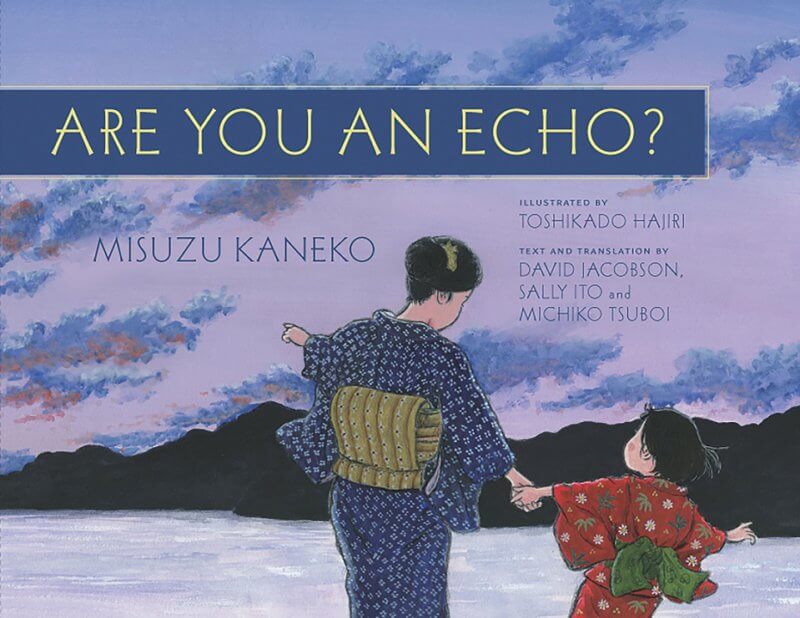23 Nov / Are You an Echo?: The Lost Poetry of Misuzu Kaneko by David Jacobson, illustrated by Toshikado Hajiri, translated by Sally Ito and Michiko Tsuboi

 Japan’s latest tsunami warnings were just recently lifted, saving countless citizens from another Fukushima disaster-like tragedy which killed over 20,000 people and left hundreds of thousands homeless in March 2011. Amidst the apocalyptic aftermath, human goodness prevailed. Five years ago, a single poem managed to reach millions of people in Japan, reminding survivors of “the power to respond,” and inspiring almost a million volunteers to rush to the devastated Tōhoku region to help. That poem, which was broadcast as one of numerous public service announcements following the disaster, was “Are You an Echo?” by Misuzu Kaneko, who passed away over eight decades ago.
Japan’s latest tsunami warnings were just recently lifted, saving countless citizens from another Fukushima disaster-like tragedy which killed over 20,000 people and left hundreds of thousands homeless in March 2011. Amidst the apocalyptic aftermath, human goodness prevailed. Five years ago, a single poem managed to reach millions of people in Japan, reminding survivors of “the power to respond,” and inspiring almost a million volunteers to rush to the devastated Tōhoku region to help. That poem, which was broadcast as one of numerous public service announcements following the disaster, was “Are You an Echo?” by Misuzu Kaneko, who passed away over eight decades ago.
Born in 1903, Misuzu lived a short, difficult life, but her poetry was full of “a deep kindness toward all things whether they are alive or inanimate.” Unlike most girls of her generation whose schooling stopped at sixth grade, Misuzu was educated through the age of 17 at her widowed mother’s insistence; as a young adult, she found inspiration and shelter working in the family bookstore. She published her first poems at 20, and quickly gained renown as a children’s writer. A stifling marriage cut short her talent, her health, her very life; she was dead by 26, and her work was lost – almost forever.
In the 1960s, a young poet and literary scholar-to-be, Setsuo Yazaki, happened upon one of Misuzu’s poems in a children’s magazine. “[M]esmerized,” Setsuo wanted to know more about Misuzu, but found virtually nothing. Undeterred, he spent 16 years searching for Misuzu until he discovered her then-77-year-old younger brother in 1982; the brother shared Misuzu’s three battered diaries holding 512 poems written during her brief life. With his assistance, Setsuo was able to piece together “who Misuzu really was.”
Today, Misuzu’s poems “are part of every child’s curriculum at Japanese elementary schools,” and her work available internationally in 11 languages. For the first time – thanks to Seattle’s media indie Chin Music Press – Stateside audiences get to experience Misuzu’s playful images, her thoughtful questions, her empathetic concerns, written with such clarity and simplicity as to be easily accessible to the youngest audiences.
This gorgeously illustrated volume is a hybrid creation combining a biographical narrative written around 10 carefully curated poems, which then give way to an additional 15 more verses presented in both English translation and corresponding original Japanese. The accomplishment is undoubtedly the work of a global village, from Misuzu’s tenacious devotee, Setuso, who provides the introduction; to writer David Jacobson whose ending “Author’s Note” is both testimony and further explication about Misuzu’s legacy; to illustrator Toshikado Hajiri who adds open emotions, hidden humor, and deep pathos through his expansive watercolors; to translators Sally Ito and Michiko Tsuboi who were independently, serendipitously working on Misuzu’s work even before this exceptional collaboration, who provide even more elucidation about Misuzu’s nuanced language. [Ito’s illuminating essay for Electric Lit about her personal history with Misuzu’s work is not to be missed; click here to read.]
As we give thanks this week amidst tumultuous times, let Misuzu’s resonating words offer the same “comfort and hope” as they did, most recently, when her fellow countrymen and women set about rebuilding their country five years ago. Her kindness and compassion live on … we just need to listen, learn, and do.
Readers: Children, Middle Grade
Published: 2016
